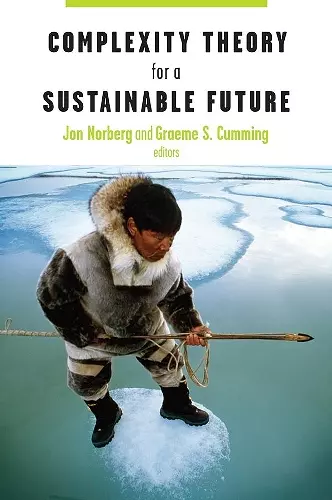Complexity Theory for a Sustainable Future
Graeme Cumming author Jon Norberg author
Format:Paperback
Publisher:Columbia University Press
Published:15th Aug '08
Currently unavailable, our supplier has not provided us a restock date

The study of complex systems has seen a flowering in the last several decades, and its historical development is well documented in this book. Jon Norberg and Graeme S. Cumming have provided the first complete effort to build a bridge between the large body of theory that has emerged from places like the Santa Fe Institute and the application of that theory to achieving a sustainable future. The editors are to be commended for their seamless integration of resilience theory, sustainability concepts, and applications to specific case studies. The book's distinguished set of authors have provided state-of-art treatments of the translation and application of concepts from the theory of complex adaptive systems to coupled social-ecological systems, from the diversity and flows in ecological communities to the emergence of norms in human societies. This book is a unique contribution to the literature and will serve as a pillar in the development of a new science of sustainability. -- from the foreword by Simon Levin, Princeton University
Complexity theory sheds light on the many interactions between natural and social systems. This book focuses on natural resource management and community-based conservation. It covers scenario planning, scaling analysis, and adaptive management. It emphasizes on understanding the conditions required for systems self-organization.Complexity theory illuminates the many interactions between natural and social systems, providing a better understanding of the general principles that can help solve some of today's most pressing environmental issues. Complexity theory was developed from key ideas in economics, physics, biology, and the social sciences and contributes to important new concepts for approaching issues of environmental sustainability such as resilience, scaling, and networks. Complexity Theory for a Sustainable Future is a hands-on treatment of this exciting new body of work and its applications, bridging the gap between theoretical and applied perspectives in the management of complex adaptive systems. Focusing primarily on natural resource management and community-based conservation, the book features contributions by leading scholars in the field, many of whom are among the leaders of the Resilience Alliance. Theoreticians will find a valuable synthesis of new ideas on resilience, sustainability, asymmetries, information processing, scaling, and networks. Managers and policymakers will benefit from the application of these ideas to practical approaches and empirical studies linked to social-ecological systems. Chapters present new twists on such existing approaches as scenario planning, scaling analyses, and adaptive management, and the book concludes with recommendations on how to manage natural resources, how to involve stakeholders in the dynamics of a system, and how to explain the difficult topic of scale. A vital reference for an emerging discipline, this volume provides a clearer understanding of the conditions required for systems self-organization, since the capacity of any system to self-organize is crucial for its sustainability over time.
ISBN: 9780231134613
Dimensions: unknown
Weight: unknown
312 pages